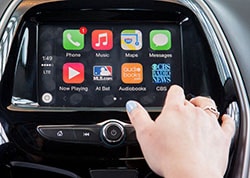
The Nielsen AutoTECHCAST report says consumers have their smart devices with them all the time and that does not change when they get in their automobiles. “In fact, despite advances in auto tech and embedded connectivity, many consumers are more apt to stick with their devices than use the connected features of their vehicle. The reason for that, according to the survey, is not because consumers don’t want to go to the Dash for their entertainment, it’s because their devices are better at providing it.
Connectivity ranks second in the survey, right behind safety. “The rub, however, is that most consumers find that their cars can’t compete with their mobile devices. So as a result, smartphone navigation integration is the top-scoring technology and the only technology in the category that garnered a “good” interest score— placing among the top 20% in automotive technology interests historically—from consumers (46.9).”






Complex dashboards, like cellphones, are murderous, mangling crashes, medical bills, personal horrors – and lawsuits in the making. Never mind ruining the day.
It only takes a split second to change stations or adjust volume the old school way. I like it like that.
This whole scenario, as Bill Maher, might say, is “bat-shit crazy”.
With some cel phone plans you can get the newest smartphone every year. If someone (like me) keeps their vehicles for many years, the dashboard tech goes quickly out of date and perhaps feels clunky compared to the latest smartphone. Unless automakers offer a free update of the dashboard every year, I don’t see how they can compete with the latest improvements to personal mobile devices.
Most do. Software updates are pushed down pretty regularly via the internet connection, or can be done at the dealership. The hardware stays the same, but then again, your newest latest greatest smartphone is at it’s core tremendously similar to first gen units.
The main reason why drivers prefer phones to dashes is that phones are their own—almost extensions of their own bodies—while dashes belong to the car, and in most cases are harder to operate than phones.
Worse, some drivers (not clear how many) are creeped out by knowing that their car maker is likely to be sharing personal data with insurance companies and other corporate partners. Aside from the awful manners involved in this, it also compromises the degree to which drivers feel that the car is theirs, and not the maker’s.
Old-fashioned pre-surveillance cars where unambiguously extensions of their drivers. When you said “my engine,” “my wheels” and “my fender,” you meant that almost literally. A car built to spy on its driver just isn’t the same.
In 2018, when the GDPR (General Data Protection Regulation) comes into force in the EU, those collecting personal data will be required to get the individual’s permission before doing so, and to give back whatever data is collected. This will have ripple effects far beyond the EU. (Where at least two car makers, I believe — Volkswagen and BMW — have long since committed not to collect personal data without permission as a matter of policy.)